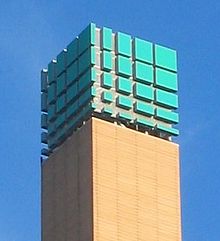debis system house
Debis Systemhaus ( dSH ) was the largest German manufacturer-independent IT service provider at the time in the 1990s . Debis Systemhaus was founded as a GmbH by debis AG , a subsidiary of Daimler-Benz AG .
General

The name "debis" stood for "Daimler-Benz InterServices". The almost 50 percent participation of debis Systemhaus GmbH in the privatized Bremen company Informations- und Datentechnik Bremen (ID Bremen), which emerged from the computer center of the Bremen administration, was presented in 1997 as an exemplary example of private-public partnership .
In 1998 the company added the name “DaimlerChrysler Services”. Debis Systemhaus was founded in 1990 as part of an outsourcing of the Daimler-Benz data centers and system service providers and was sold to Deutsche Telekom at the end of 2000 to 50.1% and at the beginning of 2002 , where the new telecom brand T- Systems made.
In 1999, shortly before the sale to Telekom, debis Systemhaus had more than 20,000 employees worldwide, 5,000 of them outside Germany. The turnover was just under 5.75 billion marks, of which about 30% came from foreign business. In doing so, debis Systemhaus managed to generate more than 75% outside of the DaimlerChrysler group.
Karl Heinz Achinger was the chairman of the debis Systemhaus from its founding in 1990 until February 2000. In the period up to the antitrust approval of Deutsche Telekom's participation in the dSH in October 2000, Konrad Reiss held the position of chairman for a short time , and until the merger with T-Systems at the end of 2002, Karl-Heinz Streibich was chairman.
The paradigm shift in the management of large corporations - here Daimler-Benz and DaimlerChrysler - has been reflected in the history of debis Systemhaus since the 1980s. After Edzard Reuter had expanded Daimler-Benz with his strategy of diversification to include AEG , Dornier and MTU , the founding of debis Systemhaus was an expression of the outsourcing movement, from which dSH ultimately also benefited. Jürgen Schrempp , who took over as Chairman of the Board of Management of Daimler-Benz in 1995, pursued, in addition to his internationalization strategy, which also rubbed off on dSH, the strategy of “focusing on the core business”, the final consequence of which was the sale of the debis system house.
Business areas
Around 1995 dSH adopted the motto “Plan-Build-Run” as an expression of a comprehensive range of IT services. The three phases of consulting (plan), software projects (build) and operation (run) partly reflect the divisions of the dSH. (As of 1997)
- Computer communication services
- Industry / trade / finance (software development)
- Telecommunication, public sector and transport (software development)
- Sales systems / commercial systems / training (software development)
- Business consulting
history
Debis Systemhaus GmbH, Stuttgart, was founded in 1990 as a strategic division of the Daimler-Benz service subsidiary debis AG . The data centers and system development departments of the companies of the Daimler-Benz group formed the core. The company for electronic information processing mbH (GEI), Aachen and the computer center of Metallgesellschaft AG, Frankfurt / Main were also purchased.
- In 1991 dSH expanded its portfolio in the field of IT consulting services by purchasing Diebold Deutschland GmbH with its foreign investments. In the same year, seven data centers were taken over from the Daimler-Benz group. ( Messerschmitt-Bölkow-Blohm GmbH, Munich and Telefunken Systemtechnik GmbH, Ulm)
- In 1992 debis Systemhaus entered into a joint venture with CAP Gemini Sogeti SA , Grenoble, in order to merge the software activities of debis Systemhaus GmbH and the German holdings of the CAP Gemini group. Accordingly, “CAP debis” was placed in front of the names of the subsidiaries concerned. When the company was renamed debis Systemhaus GmbH, Hamburg, in 1994, the shareholders were debis AG with 80% and CAP Gemini with 20%.
- In 1996 debis Systemhaus acquired the majority in PCM Computer AG, Munich.
- 1997 Acquisition of the 20% stake held by Cap Gemini. This means that debis AG, Berlin was once again the sole shareholder of debis Systemhaus GmbH, Leinfelden-Echterdingen.
The years 1998 and 1999 were dominated by the internationalization strategy. Business activities inside and outside Europe were expanded and additional foreign companies were acquired.
In October 2000, DaimlerChrysler, as the owner of debis AG, sold 50.1% of the debis system house to Telekom. The debis system house thus formed the basis for the new company T-Systems International GmbH, Frankfurt a. In 2001, Telekom subsidiaries from the IT service area were transferred to T-Systems.
Finally, on January 1, 2002, T-Systems took over the remaining 49.9% of the debis system house.
swell
- ↑ Weser-Kurier of November 18, 2000, page 25: “ID Bremen: A prime example for private-public partnership”, access via the digital newspaper archive on July 29, 2015
- ↑ heise newsticker, March 27, 2000
- ↑ http://www.bitkom.org/de/wir_ueber_uns/24622_42210.aspx
